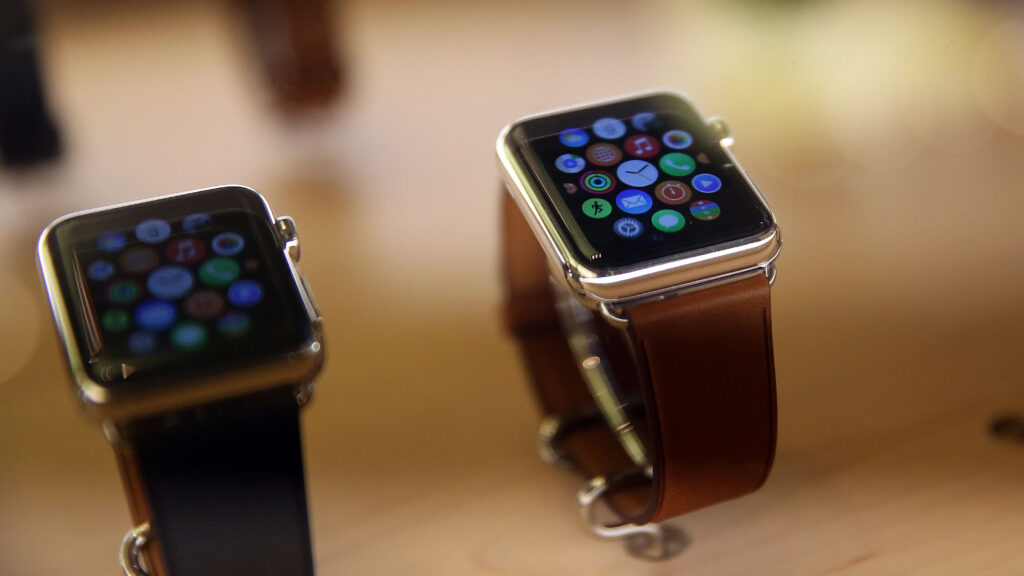CUPERTINO, Calif. — Apple on Monday announced a new Apple Watch feature that alerts users that they may have sleep apnea. It’s the latest step in the company’s decade-long effort to sell its wearables as a tool that can help people live healthier lives.
Additionally, the company has announced more hearing health features for its wireless earbuds. The company’s AirPods will be able to perform a hearing test and later this fall can be used as an “over-the-counter, clinical-grade hearing aid,” Sumbul Desai, Apple’s vice president of healthcare, said in a pre-recorded announcement video.
The new sleep apnea feature uses the watch’s built-in sensors to detect the dangerous sleep disorder where people have interrupted breathing. At least 25 million Americans suffer from the condition, which can lead to daytime fatigue and increase the risk of cardiovascular disease and other negative health consequences. However, it remains unclear how this new feature will fit into or change the clinical practice of sleep medicine – an ongoing challenge for the data generated by wearables.
The feature monitors users for disturbances while they sleep and alerts users with “signs of moderate to severe sleep apnea,” Desai said. The feature provides educational materials and a detailed report that can be shared with a doctor.
Desai said the algorithm was developed using machine learning with an “extensive data set of clinical-grade sleep apnea tests.” The algorithm was then validated in a “clinical study of unprecedented size for sleep apnea technology,” Desai said. Additional information about this clinical work was not immediately available.
Desai said it expects Food and Drug Administration clearance for the sleep apnea feature “very soon” and that the feature would be available in September on new Apple Watches and the 2023 Series 9. She also said an FDA clearance for the sleep apnea feature would be coming soon. hearing aid technology would come.
Christine Lemke, the CEO of Evidation Health, a consumer health data company, said a wearable’s sensors are probably best suited for screening rather than definitive diagnosis.
Still, she said, “It’s impressive to receive a proactive alert to investigate this further with your doctor. This appears to be a point where the sensors are good enough to provide valuable information for pre-screening purposes.”
Apple’s initial health effort focused on fitness tracking, but it has since launched a slew of Apple Watch, iPhone, and AirPod features to give users more information about their health. The Apple Watch also allows people to take electrocardiograms and detect hidden atrial fibrillation. The company has also launched features that detect people’s cardio fitness and determine whether they are at risk of falling due to unsteady walking.
Like Apple’s other health features, sleep apnea detection comes with benefits, such as helping people discover hidden health issues and tradeoffs. Many of these characteristics alert people to a health care system that may not be prepared for them.
“These improved screening tools always sound good,” said Joseph Ross, a professor at Yale Medical School who is completing a study of the Apple Watch in clinical practice. “But the reality is a little more complicated. How many people screen positive? How many of them actually have the problem? What is the impact on subsequent healthcare use and costs? What is the impact in terms of concerns and anxiety among consumers as they wait for more traditional clinical screening? It’s all a nice balance.”
Apple is not the first to bring this to the market. Samsung previously received approval from the Food and Drug Administration for a feature that allows the company’s Galaxy Watch to detect sleep apnea. And the FDA has approved a number of other devices that allow people to screen themselves for sleep disorders. Google-owned Fitbit has explored sleep apnea technology in the past.
The company did not specify which sensors are used in the sleep apnea feature. Samsung’s feature uses pulse oximetry technology. Apple is currently banned from selling similar technology in the United States after a court ruled that Apple had infringed on patents owned by medical device company Masimo.
Sleep tracking is a key feature of wearable devices, and Apple has introduced a steady series of developments in recent years. In 2017, Apple acquired Beddit, a company that developed a sleep tracking mat.

